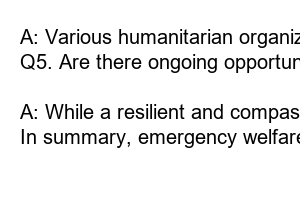긴급복지 신고의무자 교육
Title: Emergency Welfare Reporter Training: Equipping Heroes to Save Lives
Introduction:
In times of crisis, the role of emergency welfare reporters becomes increasingly crucial for effective response and assistance. These trained professionals are the unsung heroes of emergency situations, providing vital on-the-ground information, coordinating relief efforts, and ultimately helping to save lives. Let’s delve into the importance of their training and how it prepares them for these critical roles.
1. The Significance of Emergency Welfare Reporting:
Emergency welfare reporters act as the eyes and ears of relief organizations during emergencies, ensuring that accurate information is relayed promptly and effectively. They play a pivotal role in assessing needs, coordinating resources, and facilitating efficient emergency responses.
2. Comprehensive Training for a Rapid Response:
To carry out their responsibilities with utmost efficiency, emergency welfare reporters undergo rigorous training programs. These courses cover a wide range of topics such as disaster management, first aid, crisis communication, community engagement, and conducting needs assessments. The training equips them with the necessary skills to operate effectively amidst chaotic situations and rapidly changing circumstances.
3. Realistic Simulations for Practical Experience:
Training programs for emergency welfare reporters often incorporate realistic simulations to provide hands-on experience. These simulations expose trainees to the challenges they may face on the ground, ranging from triage situations and logistical hurdles to emotional trauma and language barriers. This practical experience helps improve decision-making and enhances their ability to respond effectively during emergencies.
4. Effective Communication and Crisis Reporting:
Emergency situations demand clear and concise communication, and this is an essential skill that emergency welfare reporters acquire through their training. They learn to transmit critical information accurately, using simple language and avoiding jargon. Their training includes writing emergency situation reports, press releases, and updating social media platforms, ensuring the public remains well-informed.
5. Psychological Preparedness and Self-Care:
Witnessing traumatic events can take a toll on emergency welfare reporters. To ensure their well-being and sustainability, comprehensive training programs address the psychological impact of the job. They learn about self-care strategies, stress management techniques, and the importance of debriefing sessions. This training prepares them to cope with the emotional challenges and remain resilient in the face of adversity.
6. Collaborative Networking and Resource Mobilization:
Emergency welfare reporters work hand in hand with local communities, humanitarian organizations, and government agencies. Through their training, they develop skills in networking, building relationships, and mobilizing resources efficiently. These collaborative efforts result in a more coordinated response, ultimately helping affected communities recover more swiftly.
FAQs (Frequently Asked Questions):
Q1. How long does emergency welfare reporter training take?
A: The duration of training programs can vary, but they typically span between one week to one month, depending on the level of intensity and the specific topics covered.
Q2. What qualifications are required to become an emergency welfare reporter?
A: While formal qualifications may differ, most programs require individuals to have a high school diploma or equivalent. Prior knowledge or experience in disaster management or journalism can be beneficial but is not always mandatory.
Q3. Are there any physical fitness requirements?
A: While physical fitness is important in emergency situations, specific requirements may vary. Some programs may have basic fitness standards, whereas others focus more on mental preparedness and decision-making abilities.
Q4. How can one find emergency welfare reporter training opportunities?
A: Various humanitarian organizations, government agencies, and non-profit entities offer emergency welfare reporter training. Online searches, contacting local emergency response agencies, or reaching out to relevant professional organizations are effective ways to find suitable training opportunities.
Q5. Are there ongoing opportunities for professional development and staying updated in the field?
A: Yes, the field of emergency welfare reporting is constantly evolving. Many organizations offer continuous professional training and knowledge sharing events to keep reporters updated on the latest techniques, technologies, and best practices.
Q6. Do emergency welfare reporters require a specific personality type?
A: While a resilient and compassionate personality is beneficial, individuals from diverse backgrounds can excel in this role. Training programs often aim to develop necessary skills and qualities, allowing individuals to thrive as emergency welfare reporters.
In summary, emergency welfare reporter training plays a vital role in preparing individuals to handle the challenges of emergency situations. Through comprehensive training, realistic simulations, effective communication skills, and psychological preparedness, these unsung heroes are equipped to facilitate rapid and efficient responses during critical times.

